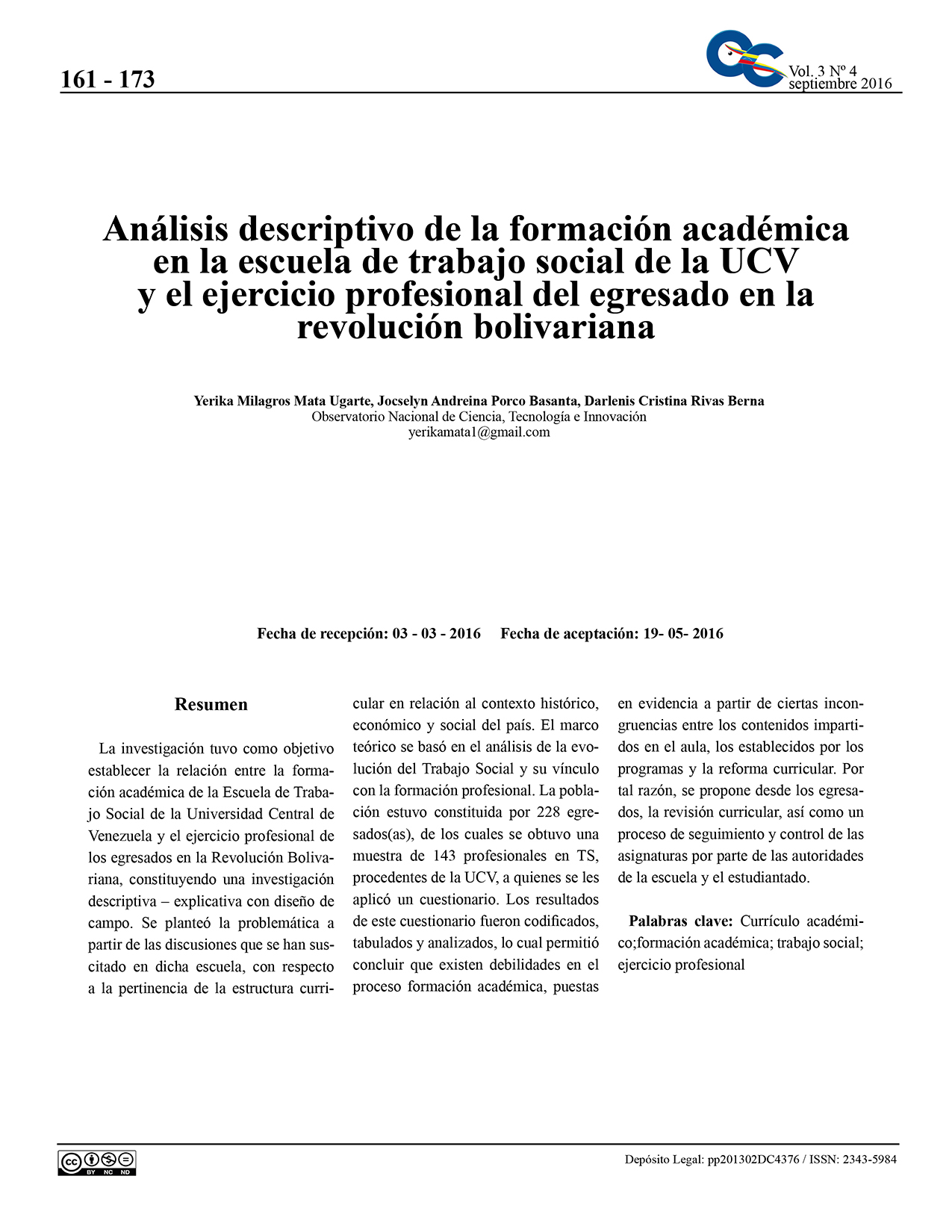Descriptive analysis of the academic training in the school of social work of the UCV and the professional exercise of the graduate in the bolivarian revolution
Keywords:
Academic curriculum, academic training, social work, professional practiceAbstract
The objective of the research was to establish the relationship between the academic training of the School of Social Work of the Central University of Venezuela and the professional practice of the graduates in the Bolivarian Revolution, constituting a descriptive - explanatory research with field design. The problem was raised from the discussions that have arisen in this school, with respect to the relevance of the curricular structure in relation to the historical, economic and social context of the country. The theoretical framework was based on the analysis of the evolution of Social Work and its link with professional training. The population was constituted by 228 graduates (as), of which a sample of 143 professionals in TS was obtained, coming from the UCV, to whom a questionnaire was applied. The results of this questionnaire were codified, tabulated and analyzed, which allowed concluding that there are weaknesses in the academic training process, evidenced by certain inconsistencies between the contents taught in the classroom, those established by the programs and the curricular reform . For this reason, it is proposed from the graduates, the curricular revision, as well as a process of monitoring and control of the subjects by the authorities of the school and the student body.
Downloads
References
Alayon, N. (2006) La desigualdad social: desarrollo y desafío del trabajo social desde la reconceptualización en América latina. En: perspectivas, (17), (51).
Amin, S. (2001) Por la Quinta Internacional (única Ed.) El viejo topo.
Ander – Egg, E. (1975). Del ajuste a la transformación; apuntes para una historia del trabajo social. Buenos Aires: ECRO. Aquin, N. (1996) Ensayos sobre Ciudadanía: Reflexiones desde el Trabajo Social. Espacio editores.
Arias, F. (2006). El Proyecto de Investigación, Introducción a la Metodología Científica (5ª ed.) Caracas: Episteme.
Balestrini, M. (2002). Cómo se Elabora el Proyecto de Investigación (6ª ed.) Caracas: BL Consultores Asociados. Servicio Editorial.
Barreix, J. (2006) Historia del servicio social, esquema dialéctico para su elaboración e interpretación. Hoy en Trabajo Social. (Nº 1920), (17).
Best, J. (1982) Como Investigar en Educación. (9ª edición) Ediciones Morata.
Briones, G. (1982) Métodos y Técnicas de Investigación para las Ciencias Sociales. México. Trillas.
Contreras, A. (1988) Trabajo Social en el Capitalismo (16ª edición) Universidad Central de Venezuela, Consejo de desarrollo Científico y Humanístico. Caracas. Venezuela.
Fonseca, L. (1984) Educación y Formación Continuada, referencias al Trabajo Social (1º ed.) Caracas: Universidad Central de Venezuela, FACES, División de Publicaciones.
Fuenmayor, E. (1996). Paradigmas Científicos del Trabajo Social (edición) ciudad: editorial
García, S. (1991) Especificidad y Rol en Trabajo Social: Currículo, Saber y Formación.
Hernández, S. Fernández, C. y Baptista, P. (2003) Metodología de la Investigación (3ª Edición) México. McGrill-Hill. Kisnersman, N. (1974) Servicio Social al Pueblo. Hvmanitas. Buenos Aires.
Konopka, G. (1968) Paradigms of Clinical Social Work. Published by Bruner/ Mazel, Inc.
Ley de Universidades. (1978, Septiembre, 08). (Articulo Nº 187) Gaceta Oficial Nro. 1424
Lima, B. (1974) Contribución a la Metodología del Trabajo Social (1ª ed.) Caracas: Universidad Central de Venezuela, FACES, División de Publicaciones.
Manrique, M. (1982) De Apóstoles a Agentes de Cambio, El Trabajo Social en la Historia Latinoamericana (1ª ed.) Lima:CELATS.
Méndez, A. (1992) Estado, Política Social y Trabajo Social en la Venezuela Actual (1ª ed.) Caracas: Universidad Central de Venezuela, FACES, División de Publicaciones.
Montoya, L.; Parra, A. y Otros. (1976). La Formación Práctica para optar al Titulo de Licenciado en Trabajo Social. Trabajo de Grado. No publicado. Universidad Central de Venezuela, Caracas. Pulido, A. (1990) La Práctica como Proceso Fundamental en la Formación del Trabajador Social. Caracas: FACES/ UCV Seijas, L. (1981) Investigación por Muestreo. Universidad Central de Venezuela. Facultad de Ciencias Económicas y Sociales. Caracas. Venezuela.
Sunkel y Paz (1976) El Subdesarrollo Latinoamericano y la Teoría del Desarrollo (10ª Edición) Siglo veintiuno editores. Vélez, O. (2003). Reconfigurando el Trabajo Social: perspectivas y tendencias contemporáneas (1ª ed.) Buenos Aires. Espacio. Vieira, J. (2000) Reflexiones de sobre el proceso de reforma curricular en la Escuela de Trabajo Social/UCV (Ideas para el debate). Caracas: FACES/ UCV.
Universidad Central de Venezuela. (1970). Plan de Estudio de la Escuela de Trabajo Social. Facultad de Ciencias Económicas y Sociales, Escuela de Trabajo Social Caracas: Mimeográfica, (8). Universidad Central de Venezuela. (1994). Reforma Curricular para la Escuela de Trabajo Social. Facultad de Ciencias Económicas y Sociales, Escuela de Trabajo Social Caracas: Mimeográfica.

Downloads
Published
How to Cite
Issue
Section
License

This work is licensed under a Creative Commons Attribution-NoDerivatives 4.0 International License.







